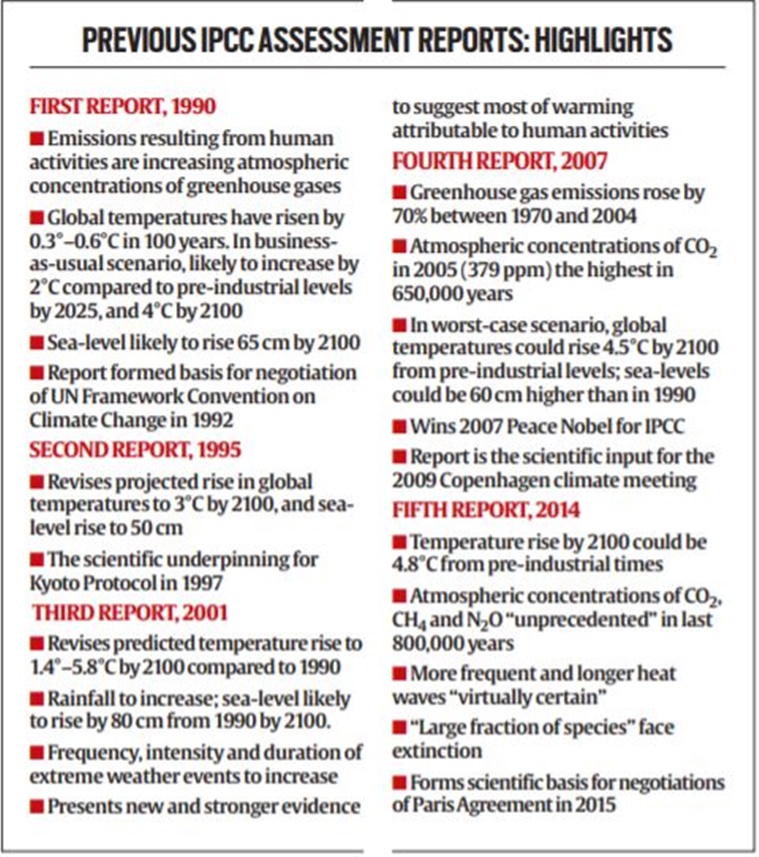Explained: Status check on world climate

In the last few weeks, the world has seen unexpected floods in Europe and China, record-breaking heat-waves in the United States, and deadly forest fires in Siberia, and Turkey and Greece. Amid gloomy predictions of a continued rise in the frequency and intensity of such extreme weather events, all attributable to global warming, scientists are set to present the most comprehensive health check-up of the Earth’s climate on Monday.
The Geneva-based Intergovernmental Panel on Climate Change (IPCC) will release the first part of its Sixth Assessment Report, the periodic status check that has now become the most widely accepted scientific view of the state of the Earth’s climate. This part of the report will present the latest scientific understanding of the climate system, how and why is it changing, and the impact of human activities on this process.
The second and third parts of the report, dealing with the expected impacts of climate change, and the actions required to prevent the worst impacts, are slated to come out next year.
The Assessment Reports
The five previous assessment reports (see box) that have come out since the IPCC was established in 1988 have formed the basis of international climate change negotiations, and the actions that governments across the world have been taking in the last three decades to restrict the rise of global temperatures. Their value has been globally acknowledged, and the fourth assessment report, which came out in 2007, won the IPCC the Nobel Peace Prize.
Each of these voluminous reports, the last couple of them running into thousands of pages, have built upon the previous ones with updated knowledge and understanding of the climate system. All of them, starting from the first one in 1990, have been categorical in stating that the rise in global surface temperatures since the 1950s was most likely caused by human activities, and that any rise beyond 2°C, compared to the temperatures of the late 19th century, would make the Earth extremely difficult place to live for human beings, and thousands of other species of plants and animals.
The reports have also presented projections for temperature rise till 2100 under different scenarios and the kind of impacts that can be expected under each of these pathways.
 Previous IPCC assessment reports: highlights
Previous IPCC assessment reports: highlights
What will be new
Apart from incorporating the latest available scientific evidence, the Sixth Assessment Report is also attempting to provide more actionable information to help governments take policy decisions.
REGIONAL FOCUS: Thus far, the IPCC assessment reports have been presenting global scenarios. However, there are likely to be wide variations in the expected impacts of climate change from region to region, as acknowledged by the assessment reports themselves. The Sixth Assessment Report will put much more emphasis on regional assessment. So, it is expected that this report would likely state what the scenarios for sea-level rise in the Bay of Bengal region is, not just what the average sea-level rise across the world is likely to be.
EXTREME EVENTS: There is expected to be bigger focus on extreme weather events, like the ones we have seen in the last few weeks. Linking individual extreme events to climate change has always been debatable. But in the last few years, there has been significant advancement in attribution science, allowing scientists to say whether a particular event was a result of climate change. Attribution science is likely to get important space in the report.
CITIES: Densely populated mega-cities are supposed to be among the most vulnerable to impacts of climate change. The Sixth Assessment Report is expected to present specific scenarios the climate change impacts on cities and large urban populations, and also implications for key infrastructure. This is expected to be included only in the second part of the Sixth Assessment Report due next year.
SYNERGIES: IPCC is expected to present a more integrated understanding of the situation, cross-link evidence and discuss trade-offs between different options or pathways, and also likely to cover social implications of climate change action by countries.
Why it matters
The IPCC assessment reports have been extremely influential in directing the dialogue and action on climate change. The First Assessment Report led to the setting up of the UN Framework Convention on Climate Change, the umbrella agreement under which international negotiations on climate change take place every year. The Second Assessment Report was the basis for the 1997 Kyoto Protocol that ran till last year, and the Fifth Assessment Report, which came out in 2014, guided the Paris Agreement.
The global climate architecture is now governed by the Paris Agreement, which replaced the Kyoto Protocol from this year. There have been enough indications to suggest that global action was far below what was needed to keep the temperatures below 2°C, as mandated under the Paris Agreement. In the immediate future, the IPCC report could serve as the most important warning towards the rapidly closing window of opportunity to halt the rise in temperatures to unacceptable levels, and propel the governments to take more urgent actions.

“평생 사상가. 웹 광신자. 좀비 중독자. 커뮤니케이터. 창조자. 프리랜서 여행 애호가.”
